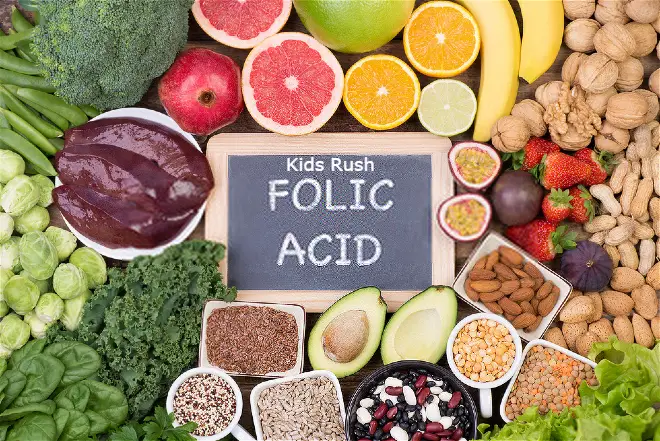Folate, also known as folate or folic acid, is an essential vitamin that belongs to the B group of vitamins and plays a key role in maintaining healthy cell growth and development. You can benefit from folic acid consumption while pregnant by developing a healthy neutral tube that develops in the spinal cord and brain of the baby. You circulate more blood throughout your body as your uterus enlarges and your placenta grows. During pregnancy, your body experiences an increase in foliate requirements, which can only be met by adequate amounts of folic acid.
The benefits of folic acid before pregnancy
Many women are not taking folic acid supplements or consuming low dietary folate. The sooner you start taking folic acid, the better. Your fetus will be protected from diseases when you take this supplement. To get you thinking about why folic acid before pregnancy is essential, here are a few things you should know:
- During pregnancy, it reduces the risk of miscarriage and complications. Similarly, neural tube defects (NTDs) such as spinal Bifida (a congenital malformation of a vertebra) and anencephaly (a defect in brain development that results in small or missing brain hemispheres) can be prevented.
- Nutritional deficiency can cause neural tube defects (NTDs), which can be prevented by fortifying the diet with folic acid supplements. For more please read our article: Nutrition During Pregnancy.
- You can protect your baby from risks of cleft lip, miscarriage, and palate (roof of the mouth) by taking folic acid.
- If your blood level of homocysteine is too high, you may experience unintentional abortion and pregnancy complications. Folic acid deficiency increases your risk of preterm delivery.
- During the growth and development of your cells, folic acid protects them from damage that may cause them to develop cancer in older age.
Pre Pregnancy Folic Acid Intake
The majority of pregnancies are unplanned, and therefore, to prevent birth defects, taking folic acid supplements is a good idea before getting pregnant. Three months before conceiving and during the first three months of pregnancy, it is recommended that you take folic acid supplements.
Read Also: Is It Safe to Eat Ice Cream During Pregnancy?
The effects of taking folic acid supplements before pregnancy
There are numerous benefits of taking folic acid supplements, but if they are taken in excess, they can also cause some undesirable effects. Folic acid supplements taken by pregnant women are associated with a higher risk of infants being born with asthma and respiratory tract infections. There is an alarming study that found that women taking folic acid during pregnancy had a higher risk of dying from breast cancer than women who did not take folic acid during pregnancy. [1]
In addition to colon cancer formation, studies suggest that taking folic acid may also increase the risk of developing preneoplastic cells in the colon [2]. There are benefits and disadvantages to taking folic acid, so make sure you weigh them both. Any side effects such as trouble with breathing, fever, general discomfort, tightening of the chest, or rashes should be reported to your doctor if you feel you have taken too much folic acid during or before your pregnancy.
Discover: Is It Safe To Eat Calamari During Pregnancy?
What is the recommended amount of folic acid before pregnancy?
To prevent developing neural tube defects (NTDs), the American Academy of Pediatrics recommends that all pregnant women ingest 400 mg of folic acid each day. To help you get the recommended amount of folic acid, here are some guidelines:
- 400 milligrams of folic acid is recommended if you are trying to conceive or in the early stages of pregnancy.
- Pregnant women should consume 600 mcg for four to nine months while breastfeeding mothers should consume 500 mcg.
- For women with gestational diabetes, epilepsy, other health disorders, and those who are genetically predisposed to neural tube defects, higher doses of folic acid supplementation are recommended. For more information, consult your physician.
- The recommended amount of folic acid to intake daily is 4000 mg at least one month before conception if you have previously been affected by neural tube defects (NTD).
Read Also: Varicose Veins and Hemorrhoids During Pregnancy
Folic acid-rich foods
Folic acid supplements aren’t recommended since natural dietary folate comes from food. The following foods contain folic acid:
- Vegetables: Vegetables in this group are: peas, jacket potatoes, broccoli, peas, asparagus, ladyfingers, mustard greens, carrots, cauliflower, corn, lettuce, and green peppers. Radish, spinach, and fenugreek are among the leafy green vegetables that are considered good sources of folic acid.
- Fruits: Oranges, watermelons, kiwis, blackberries, bananas, pineapples, medium papayas (115mcg), raspberries, and strawberries can be included in this list. Folate, vitamins, and minerals are found in many fruits.
- Nuts: It is best to eat walnuts, almonds, hazelnuts, sunflower seeds, sesame seeds, cashew nuts, and peanuts. Having folate-rich snacks at home will help you consume a healthy diet during pregnancy.
- Grains: The foods you should include are pasta, cereals, brown rice, and whole-grain flour. They are slower and steadier sources of energy due to their slow digestion. With daily servings of low-fat milk, or just for snacks throughout the day, you can serve fortified cereals.
- Legumes: Beans, lentils, chickpeas, meat, wheat germ, soybeans, and kidney beans. Supplemental folic acid cannot be obtained from these foods. Do not take them in place of your supplement, but rather as a compliment.
Read Also: Can Women Eat Honey While Pregnant?
Folic acid and folate are both effective when combined. In addition to folate, folic acid is a synthetically created form of nutrient that is added to various foods as supplements. A pregnant woman should not take folic acid tablets. Folic acid must be consumed in food form rather than ingested through pills to get all of its nutrients. In case you have any further doubts, you should consult your physician. Best of luck!
Article Sources

